Residential proxies are proxy servers that are hosted at residential IP addresses. A residential proxy is a type of proxy that is distinguishable from the other proxy types because it’s a proxy hosted at a residential IP address. Residential proxies were developed to provide an alternative to shared and dedicated proxies, which can be expensive.
Residential Proxies are ideal for proxy buyers who wish to remain anonymous on the internet or those who want to access blocked websites in their country.
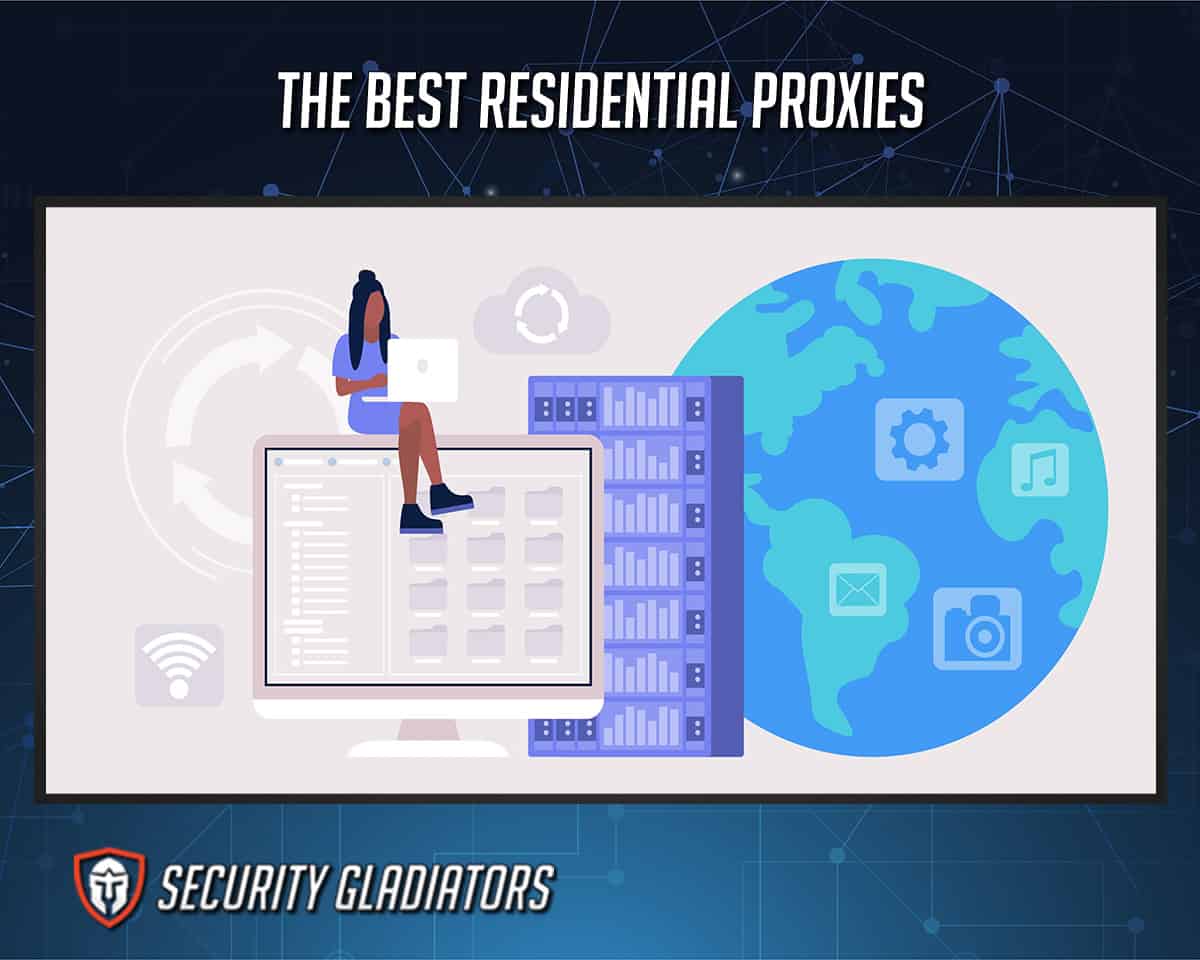
Residential Proxies are good for hiding users’ real IP addresses while surfing the internet, creating multiple accounts on social media, scraping websites, and accessing geo-restricted sites.
The best residential proxies are listed below.
- IPRoyal
- ProxyEmpire
- Smartproxy
- Oxylabs
- BeeProxy
- GeoSurf
- NetNut
- Froxy
- Bright Data
- Storm Proxies
Table of Contents
1. IPRoyal
IPRoyal Proxy Provider is a proxy service for users’ internet connections. This free proxy server is fast and reliable. This service’s server has been tested to work well in countries like India and China, where many other proxies do not work properly.
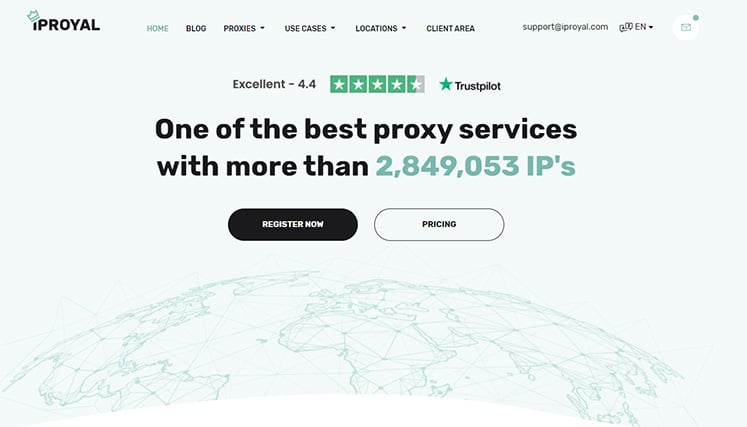
IPRoyal offers residential proxies to its customers, which can be used as rotating proxies or sticky proxies. If users decide to use their rotating ports, their IP addresses are changed after every request or within a specific period of time – 1 minute, 30 minutes, and 1 hour. IPRoyal offers a Royal IP pool with over 100,000 IPs and is considered the best choice for users who want to avoid getting blocked.
The advantages of IPRoyal include cheap proxies with no minimum monetary commitment, support for proxy list generation, providing both rotating and static IPs and ease of setup and use. On the other hand, the disadvantages of this proxy service include no IP authentication support, premium IPs getting blocked easily, and speed is not as fast as other services offer.
| Features | |
|---|---|
| Types of proxy offered | Both rotating and static residential proxies |
| Pool of proxy network | Over 10 million |
| How to authenticate | Username and password |
| Protocols | HTTPs, SOCKS5 |
| Geo-targeting | City-level targeting |
This proxy service offers rotation to every request for 24 hours. When the user connects through the IPRoyal proxy, its IP address will be displayed instead of the user’s. This makes it impossible for anyone monitoring activity on the internet to track the user’s real IP address.
| Plans | Prices |
|---|---|
| Residential Proxies | $0.80 Per GB |
| DataCenter Proxies | $1.30 Per Proxy |
| Sneaker Proxies | $0.80 Per Proxy |
| Static Residential Proxies | $2.50 Per Proxy |
2. ProxyEmpire
This service provides more than 5 million proxies. ProxyEmpire has a good support team who are always ready to help the user in any way possible. The proxies are available for all the major protocols like HTTP, HTTPS, SOCKS4, SOCKS5 and more. ProxyEmpire has more than 1000+ servers in multiple locations around the world, including the USA, Europe, Asia, etc.
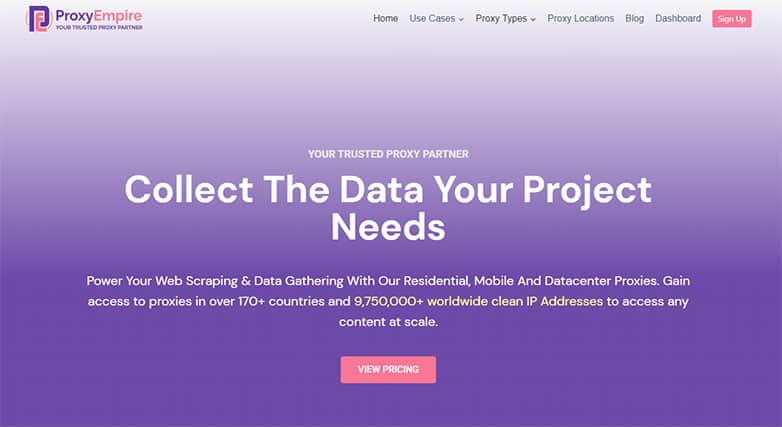
The user gets to carry out their web automation tasks, access geo-targeted and localized content, as well as unblock websites. This service allows users to create an unlimited number of concurrent connections, and there is no limit to the number of IP addresses the user can use.
The advantages of ProxyEmpire include affordable pricing, a sizable IP pool, excellent location support and integration perfectly with third-party tools. On the other hand, the disadvantages of this service include no funds and a free trial that is only available to businesses.
| Features | |
|---|---|
| IP pool size | More than 3 million IPs |
| Locations | 150+ countries |
| Concurrency Allowed | Unlimited |
| Bandwidth Allowed | Start from 3GB |
In addition to rotating residential proxies with session support, ProxyEmpire also offers real static residential proxies that never change IP addresses.
Select one of the options at the top of the page — such as “Proxy by country” or “Proxy by port.” This will tell ProxyEmpire which part of the user’s website request to modify before sending the request to its destination. Click “Go!” The user’s request will now be routed through a proxy server located in that particular country or port, allowing the user to access blocked sites and unblocked YouTube videos.
| Plans | Prices |
|---|---|
| Starter | $45 per month |
| Hobby | $150 per month |
| Startup | $300 per month |
| Business | $600 per month |
| Company | $1250 per month |
| Enterprise | $4000 per month |
3. Smartproxy
Like other residential proxy services, Smartproxy also offers datacenter proxy services to its customers. Smartproxy’s datacenter proxy service has a network of over 40 million residential IP addresses across 195 locations in the world.
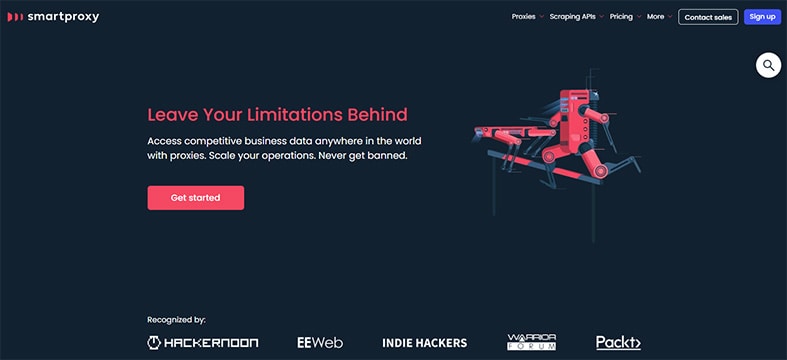
Smartproxy enables users to scrape data from the internet at an unprecedented speed and scale. Thanks to IP rotation, this proxy service prevents any suspicion from surfacing that might lead to blocking IP addresses or requests to solve captchas. Although the speed is somewhat slow, the proxy service offered by this company is secure and reliable, with about 99.99 percent uptime.
The advantages of Smartproxy include excellent customer support, an extensive IP pool and location coverage and it makes third-party integration possible. On the other hand, the disadvantages of this service include the proxy service having no free trial and being a bit slow.
| Features | |
|---|---|
| Types of Proxy offer | Rotating residential IPs |
| The pool of Proxy Network | More than 40 million IPs |
| How to Authenticate | User Pass and IP Auth |
| Geo-targeting | Cities/Countries |
| Proxy Protocol | HTTPs |
The uptime of the service measures the reliability of Smartproxy. The uptime is defined as the percentage of time that the service was up and running during a given period. The up time for Smartproxy is currently 99.96%.
| Plans | Prices |
|---|---|
| Pay As You Go | $12.5 per GB |
| Micro | $80 per month |
| Starter | $225 per month |
| Regular | $400 per month |
4. Oxylabs
Oxylabs has proven to be one of the best residential proxy providers. After the user verifies that the user owns a company or serves as a representative of one, the user can get a 7-day free trial. Most individuals have no free trial period for a personal computer. In addition, there is a three-day money-back guarantee provided the user does not consume more than 20 percent of their bandwidth allocation.
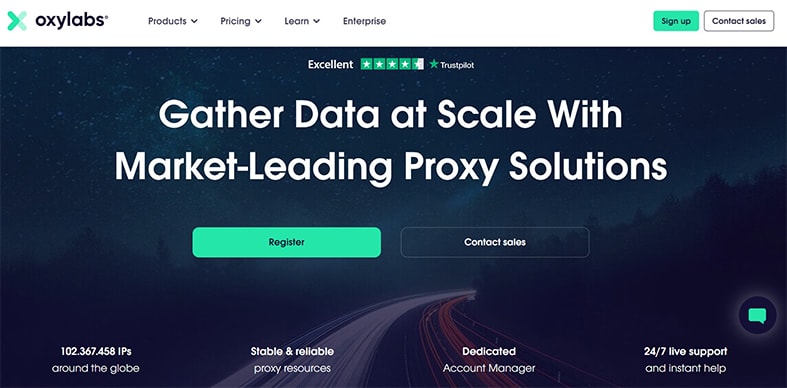
Oxylabs has one of the largest residential proxy pools in the market, making the proxy service an ideal choice for all the user’s IP masking needs. Like Bright Data, Oxylabs is a proxy service supporting all countries, states, and cities. With a massive proxy pool and rotating proxy support, Oxylabs is the ideal tool for large-scale web scraping projects.
The advantages of Oxylabs include premium proxies, global coverage in more than 180 countries and excellent customer support. On the other hand, the disadvantages of Oxylabs include a complicated dashboard setup and being too expensive for small businesses.
| Features | |
|---|---|
| IP pool size | 100 million |
| Locations | All countries supported |
| Concurrency Allowed | Unlimited |
| Bandwidth Allowed | Starts from 1GB |
| Protocols | HTTP(S), SOCKS5 |
| Authorization | Credentials, IP whitelisting |
Oxylabs residential proxies are built to deliver the best to its end users with stable p2p networks, high-end backup systems, and a dedicated customer service team. The Oxylabs proxy service works in a very simple manner. The traffic from the user’s website is routed through Oxylabs’ servers and then to the destination server. This allows the proxy service to mask the user’s IP address and protect the user from any malicious attacks.
| Plans | Prices |
|---|---|
| Shared Datacenter Proxies | $100 per month |
| Dedicated Datacenter Proxies | $180 per month |
| Residential Proxies | Starts from $15 |
| Next-Gen Residential Proxies | Starts from $360 per month |
| Mobile Proxies | Starts from $500 per month |
| Rotating ISP Proxies | $340 per month |
5. BeeProxy
The service provider guarantees dedicated, shared, and residential proxies. Furthermore, this service offers unlimited usage, and geo-targeted by the state is a significant feature of the service.
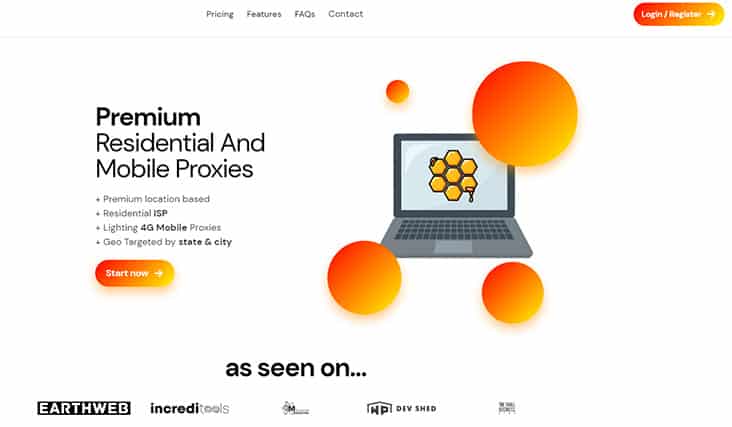
Their service also includes SSL encryption and advanced security features like HTTP headers, cookie management, and more.
The proxies provided by BeeProxy are highly secured as these proxies use 256-bit encryption technology, which keeps the user safe from any kind of threats while using their proxies. This service also provides dedicated IPs, which help in providing more security to users’ connection with them. The dedicated IPs are not shared with anyone else, so the user can use the proxy for as long as the user wants without having any trouble with privacy issues or getting banned from any website or service.
The advantages of BeeProxy include a private dashboard, an easy-to-use CAPTCHA proxy, and provides geo-targeting for accessing restricted websites. On the other hand, the disadvantages of this proxy service include poor customer support and a lack of documentation for self-service options.
| Features | |
|---|---|
| Custom Locations | All over the world |
| High Speed Servers | 1GB/s |
| Customer support | 24/7 |
| Money-back guarantee | 30-day money-back guarantee |
| Protocols | SOCKS5, HTTPs |
The proxy service adds the user’s selection to the account upon completing the protocol or proxies purchase. After that, the user can start using the service immediately.
| Plans | Pricing |
|---|---|
| Residential Proxy | $18 per GB |
| 4G Mobile Proxy | $30 per GB |
6. Geosurf
GeoSurf is a premium proxy provider, with its pricing reflecting that quality. Even though a user needs to spend at least $300 to access the company’s residential proxy network, GeoSurf offers other cheaper options as well. Nonetheless, the company does offer a 14-day free trial period for new users. This is a generous amount of time when compared to other companies, which provide only a 1-week trial period.
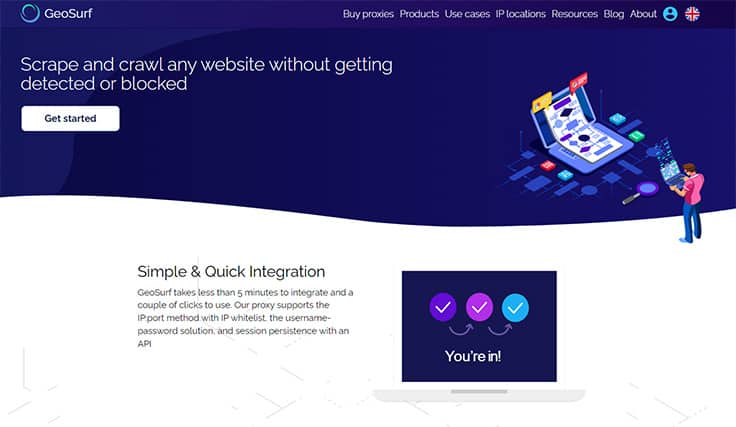
However, as with the others, this proxy service has an extensive IP address pool that includes 2.5 million residential IPs from over 100 countries across the globe. Geosurf’s proxies are undetected on most websites, making them a reliable tool for online anonymity. Their speed and ability to hide the user’s IP address make proxies ideal for streaming and online gaming.
The advantages of GeoSurf include third-party integration, user-friendly design, an excellent pool of IPs and location, and decent scraping performance. On the other hand, the disadvantages of this proxy include bad customer service and being a bit expensive.
| Features | |
|---|---|
| Proxy pool | 2.5 million monthly IPs |
| Protocols | HTTPs |
| Locations | More than 100 countries |
| Rotation | Every request and sticky sessions for 1/30 minutes |
| Support | 24/7 email support |
| Extras | Browser extension, APIs |
When the user visits a website using Geosurf Proxy Service, the user will be sent to that website’s server through Geosurf’s servers, which are located worldwide. The website will then show the user it’s content stored in the proxy service’s cache or database.
| Plans | Pricing |
|---|---|
| Explorer | $300 per month |
| Starter | $400 per month |
| Professional | $900 per month |
| Plus | $2000 per month |
| Enterprise | Special |
7. NetNut
NetNut provides residential proxy services to online marketers, researchers, and other individuals looking for a private way to access the Internet. Netnut does not rely solely on P2P networks to solve the disconnection issue. Rather, Netnut sources its IPs directly from ISPs, providing a more reliable solution than the P2P networks used by other providers.
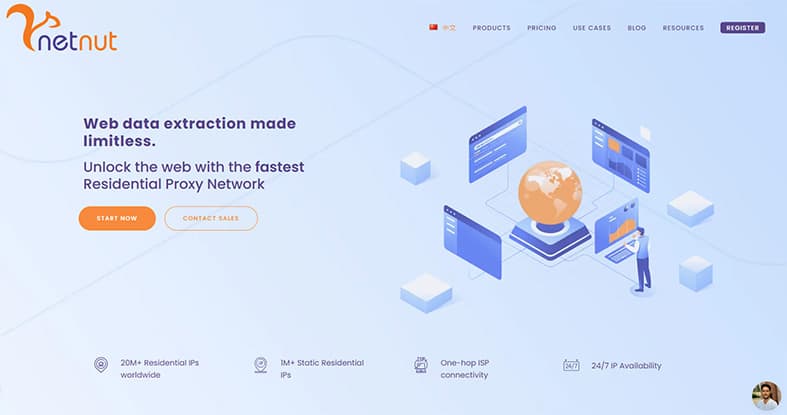
The advantages of NetNut include excellent proxy pool size, perfect session control, Powered by DiviNetworks, high speed and low latency, excellent customer support and provides a free trial. On the other hand, the disadvantage of this proxy service is that it’s a bit expensive.
| Features | |
|---|---|
| Proxy pool | 10 million monthly IPs |
| Protocols | HTTPs |
| Locations | More than 150 countries |
| Rotation | Every request or as long as the IP is available |
| Support | 24/7 email support and Skype support on larger plans |
| Extras | API for resellers and mediocre documentation |
Netnut proxy service is the ideal choice, offering speed and reliability. NetNut Proxy Service works by routing the user’s internet traffic through a proxy server first. Once the traffic is routed through this server, the traffic is sent to its intended destination.
| Rotating Residential Proxy Pricing | |
|---|---|
| Plans | Prices |
| Nano | $20 per month |
| Micro | $90 per month |
| Mini | $175 per month |
| Starter | $300 per month |
| Advanced | $600 per month |
| Production | $800 per month |
| Semi-Pro | $1625 per month |
| Professional | $2500 per month |
| Master | $4000 per month |
8. Froxy
The high-speed and reliable network can be set up in minutes, and dedicated proxies are available. For anyone wanting to conceal their IP address or protect their social privacy, Froxy is a reliable residential proxy provider. The service provides users with a static IP network, ensuring that no one can trace users’ online activity.
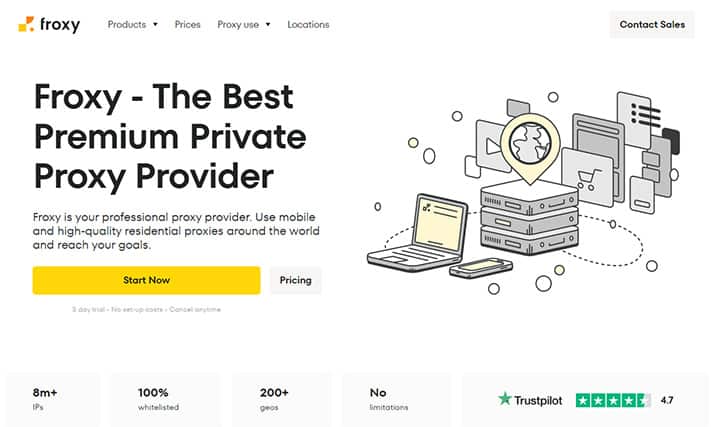
Proxy is used to unblock sites, bypass filters, surf anonymously and protect the user’s privacy. Froxy’s proxy pool of over 8 million IP addresses makes it well-suited to web scraping and other forms of automated online activity. The advantages of Froxy include a user-friendly dashboard, 99.9% uptime, global coverage and multiple payment methods. On the other hand, the disadvantages of Froxy include metered bandwidth allocation, no knowledge base and average download speeds.
| Features | |
|---|---|
| IP Pool Size | More than 8 million |
| Locations | All countries supported |
| Concurrency Allowed | Unlimited |
| Bandwidth Allowed | Starts from 5GB |
| Sessions | Unlimited |
| Protocols | HTTPs, SOCKS5 |
When the user connects to any website using Foxyproxy Service, the service will first ask for the user’s location and then route the user’s traffic through its servers in that location
| Plans | Prices |
|---|---|
| Residential Lite | $60 per month |
| Residential Starter | $150 per month |
| Residential Medium | $450 per month |
| Residential Premium | $700 per month |
| Residential Elite | $1250 per month |
| Residential Enterprise | $3000 per month |
9. Bright Data
Bright Data is one of the largest providers of residential proxies worldwide. This service offers well over 72 million residential proxies all over the world with the most advanced services. The advantages of Bright Data include an extensive proxy pool, wonderful geo-targeting, 24/7 customer support and a money-back guarantee. On the other hand, the disadvantages of Bright Data are that the service is a bit expensive and can be hard to use.
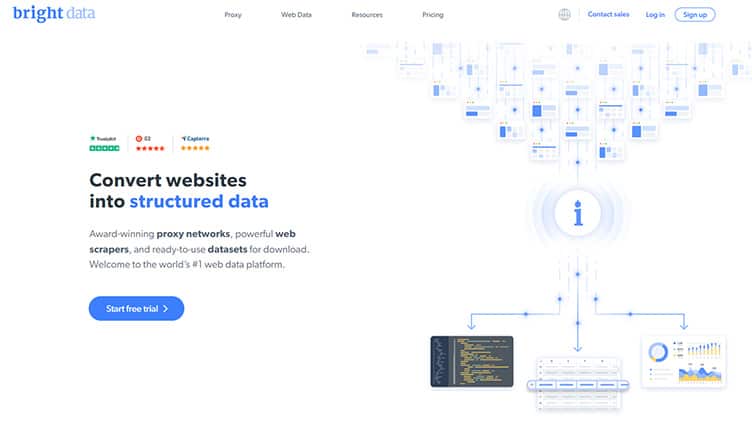
| Features | |
|---|---|
| Proxy Pool | More than 70 million monthly IPs |
| Protocols | HTTPs, SOCKS5 |
| Locations | Every country & City |
| Rotation | Every request with personalized sticky sessions |
| Support | 24/7 live chat support, dedicated account manager |
| Extras | API, Proxy Manager, browser extensions and easy documentation |
The Bright Data Proxy Service is reliable and secure. This proxy service offers fast, high-speed connections, which are ideal for streaming videos, watching movies and downloading files.
Bright Data Privacy Service enables the user to detect and remediate threats to the user’s organization’s data privacy, including data exfiltration attempts, insecure cloud storage, ransomware, user-generated content (UGC) leakage and social engineering attacks.
| Plans | Prices |
|---|---|
| Pay as You Go | $15 per GB |
| Starter | $500 per month |
| Advanced | $1000 per month |
| Advanced+ | $2000 per month |
| Enterprise | Custom |
10. Storm Proxies
The Storm Proxies network is optimized for high-speed connectivity, making the proxy service a top choice among residential proxy providers. Storm Proxies, a proxy service provider, offers rotating residential proxies in the US and EU. Their servers are fast and affordable, with instant setup and unlimited bandwidth.
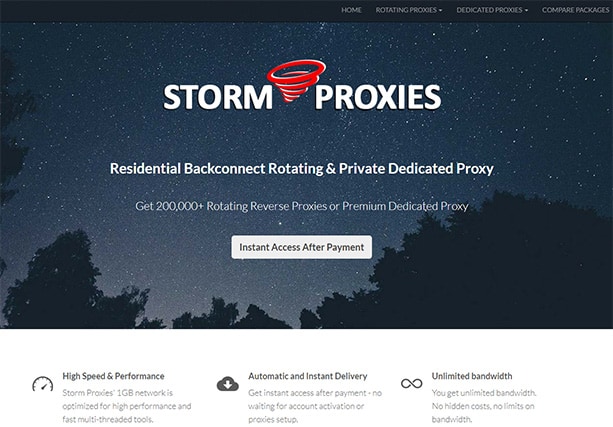
On the other hand, the provider has very limited location coverage, fewer features, and doesn’t scale well. The performance is mediocre at best, at least in the user’s experience. Storm Proxies are used for uncensored internet access and anonymity, and this service is also used to unblock websites and bypass firewalls. Storm Proxies allow users to browse the internet at fast speeds and without any restrictions.
The advantages of Storm Proxies include acceptable proxy speed, acceptable scraping performance, a responsive customer support team, an easy-to-use dashboard, and IP rotation acceptable and cheapest residential IP provider. On the other hand, the disadvantages of Storm Proxies are that this proxy service has one of the smallest IP pools and no free trial.
| Features | |
|---|---|
| Type of Proxy Offer | Rotating Residential IPs |
| The pool of Proxy Network | 40000 IPs |
| How to Authenticate | IP Authentication |
| Rotation | Every 3 or 5 minutes |
| Locations | US and EU, no country targeting |
| Support | 24/7 via email |
| Protocols | HTTPs, SOCKS% |
Storm Proxies works by allowing the user to access content that may otherwise be blocked or restricted based on the user’s location. This service also allows the user to make their browsing anonymous by hiding their true IP address while still allowing the user to browse in high definition.
Overall, Storm Proxies is a good solution for beginners who want to work with unprotected websites and don’t want to worry about bandwidth limits.
| Plans | Prices |
|---|---|
| 5 Ports Residential Proxies | $50 per month |
| 10 Ports Residential Proxies | $90 per month |
| 20 Ports Residential Proxies | $160 per month |
| 50 Ports Residential Proxies | $300 per month |
What is a Residential Proxy?
A residential proxy is a service that acts as an intermediary between the user’s device and the internet. When using a residential proxy, the user essentially hides their IP address from websites, services, and other users on the internet. This can be useful for a number of reasons, including privacy protection and anonymity online.
People who want to access blocked content or services in their country often use residential proxies. For example, if the user lives in China and wants to access YouTube or Facebook, the user could use a residential proxy to get past censorship restrictions.
Proxy servers act as a middleman between clients that want content from a website and the website itself. All requests are routed through these proxy servers before they reach their intended destination. This allows companies to monitor all traffic that comes through their network, including requests for specific websites or services and other types of communication, such as email or instant messaging. The main advantage of using proxy servers is that these servers make it possible for businesses to track employees’ internet usage without having to install software on each computer in their offices.
Note:
A residential proxy is an individual’s computer that acts as an intermediary between that person’s web browser and any websites the user wants to access. Residential proxies also allow users to conceal their true location while browsing the internet because they appear to be coming from another country when they’re actually located in another state, country, or region altogether.Residential Proxies Vs Data Center IP’s
Residential proxies are IP addresses that have been assigned to residential homes and businesses. These IPs are distributed on a first-come, first-served basis, so these IPs can change at any time. This makes them unreliable for high-traffic websites, as the user needs to know how long the address will last.
Data center IPs are more reliable because these IPs are assigned to a physical location and are less likely to change. Multiple people can also use these IPs simultaneously without affecting your traffic or security.

Residential IPs are not as reliable as data center IPs because these IPs are not always online. Since residential proxies are shared by many people in the user’s area, these proxies are possible for them to go offline at any time. This can be a problem if the user needs access to the user’s account regularly. If one of the user’s residential proxies goes offline, then the user will have to wait until another person uses it before the user can reaccess the account.
What are Residential Proxies Used For?
Residential proxies are used for a variety of purposes. These proxy servers are commonly used by SEO agencies to help clients rank higher on search engines and to create backlinks for their client websites. The residential proxy network is also commonly used for affiliate marketing. Affiliate marketers can use these proxies to make sure that their sites remain anonymous and that these proxies don’t get penalized by Google for cloaking or duplicating content.
The residential proxy network is also used by web developers who want to test out websites before they launch them online. Web developers can use a residential proxy server as a way to check how their website will perform on different devices, browsers and operating systems without having any real traffic hitting their site yet!
Residential proxies can be used for a number of things, including
- To protect your identity while browsing the Internet;
- To hide your IP address from websites you visit;
- To bypass a firewall or ISP throttling; and
- To mask your real location in order to access geo-blocked content.
- Residential proxies are great for testing websites and applications that you may be developing. These proxies can be used to test the load of the user’s website, check how the website performs under heavy traffic and much more.
- Residential proxies are also used to protect one’s privacy online by hiding their true location from websites one visits. If someone was using a shared proxy server and visited a website that required them to enter their real location, there would be no way for them to do so without having their IP address exposed in the process. This makes using shared proxy servers dangerous if privacy matters to the user.
What are the Benefits of Using Residential Proxies?
Residential proxies are the best and most common type of proxy. They are also known as residential IPs, private proxies or home IPs. Residential proxies are used by many large organizations like Google, Yahoo and Facebook to perform their research and development.
There are many benefits to using Residential Proxies, including the following:
- These proxies offer high speeds. Residential proxies can provide up to 10Gbps bandwidth speeds and around 600Mbit/s download speeds, making them ideal for streaming videos and downloading large files quickly and easily.
- These proxies are easy to use. Residential proxies were explicitly designed with home users in mind, so these proxies are easy to set up and don’t require any technical knowledge whatsoever.
- Residential Proxies are completely anonymous. Because residential proxies come from real IP addresses found in residential areas worldwide, these proxies offer complete anonymity when the user surfs online or uses social media sites like Facebook and Twitter.
- Users can bypass filters and firewalls that block them from accessing certain websites.
- The user can browse anonymously and remain hidden from prying eyes.
- Users can unblock websites like Netflix, Hulu and Pandora that are blocked in certain countries or territories.
- If the user wants to download torrents anonymously, then a residential proxy will help the user do so by masking the user’s IP address.
Is It Illegal to Use Residential Proxies?
No, Residential Proxies are not illegal to use residential proxies. However, the user should be aware of the consequences of doing so. If the users are found using residential proxies, the user’s account may be suspended or terminated without warning. The user may also have the credit card charged for any charges associated with the abuse of residential proxies.
What is the Cost of Residential Proxies?
The cost of residential proxies depends on the features and the quality of service the users are looking for.
Residential proxies can be bought in bulk packages or individually. Buying these proxies in bulk is usually more cost-effective as it reduces the price per proxy. However, the user may only need a few residential proxies, so buying one at a time may work better depending on how often the user needs them and how much money the user wants to spend on them.

The price range is between $15 and $50 per month. Most proxy providers sell their services in units of 1000 proxies and above. This means that if the user buys less than 1000 IPs, the price per proxy will be higher than if the user buys more than 1000 IPs.
The cost of residential proxies depends on a number of factors. These include:
- The location of the residential proxy server. The closer the proxy server is to the user, the faster the connection will be and the less bandwidth will be used. This means that users in North America can expect lower prices than those in South America or Africa.
- The number of simultaneous connections the user needs. The more simultaneous connections the user needs, the higher the user’s monthly fee will be.
- The type of connection the user wants: secure (SSL), insecure (non-SSL), or mixed secure/unsecure. Some providers offer all three options at different price points.
- Whether the user wants dedicated residential IPs or shared residential IPs. Shared IPs are much cheaper because multiple customers use them simultaneously, but these proxies may become unavailable if too many people use them simultaneously (e.g., during peak hours).

